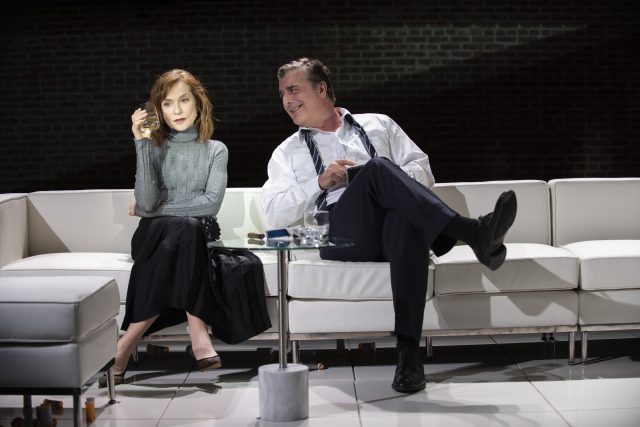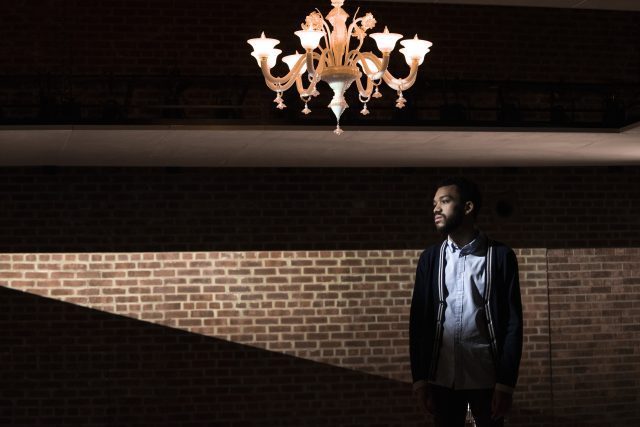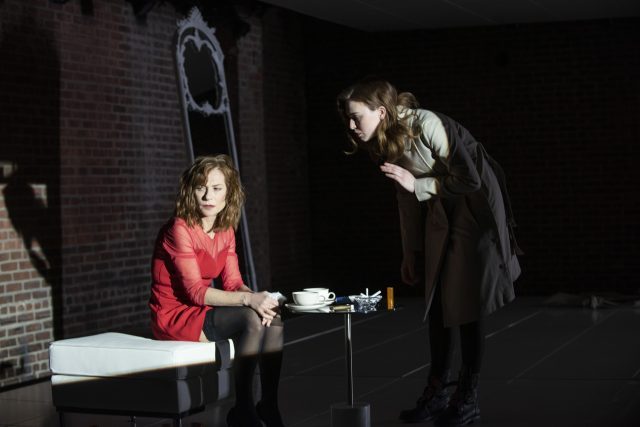
Isabelle Huppert and Chris Noth star in US premiere of Florian Zeller’s The Mother at the Atlantic (photo by Ahron R. Foster)
Atlantic Theater Company
Linda Gross Theater
336 West 20th St. between Eighth & Ninth Aves.
Tuesday – Sunday through April 13, $101.50
866-811-4111
atlantictheater.org
In 2016, Frank Langella won a Tony as the title character in the US premiere of French playwright and novelist Florian Zeller’s The Father, a gripping tale of an elegant Parisian gentleman suffering from dementia. Now Oscar nominee Isabelle Huppert stars in the US premiere of Zeller’s The Mother, a less-successful work that opened last night at the Atlantic. Written in 2010, four years before The Father, The Mother is a companion piece that follows an empty nester’s descent into depression. As the audience enters the Linda Gross Theater, Anne (Huppert) is already seated on a ridiculously long, almost blindingly white sectional couch that runs the length of the stage. She is reading a book but seems to not be paying close attention to it. Under several cushions and a small table are bottles and bottles of pills, and a wine bottle rests on the floor by a mirror. Mark Wendland’s powerful set is backed by a brick wall, as if there is no escape for any of the characters in Anne’s closed-in world. Everything is black, white, and gray, like a dream, except for a red dress. When Anne’s husband, Peter (Chris Noth), comes home from work, she is cold and distant. He asks her how her day was, and she replies, “I stayed in, did nothing. Waited. . . . I’m aware of a great void.”

The prodigal son (Justice Smith) returns in The Mother (photo by Ahron R. Foster)
In the morning, he’s scheduled for a four-day seminar in Buffalo, but she thinks he’s going away with another woman. “I’ve been had. That’s the truth of it,” she says accusingly. “I’ve been had. All the way down the line.” She is also deeply upset that her son, Nicolas (Justice Smith), never returns her calls or comes to visit, and she is intensely jealous of his girlfriend, Emily (Odessa Young). However, she doesn’t seem to care much about her daughter. “I realize now. I should never have had children. Especially with someone like you,” she tells her husband. “You’ve lost your mind, Anne,” he says. There’s a flash, and then the scene repeats, albeit with significant differences as the play explores alternate planes of reality in the mind of a woman living on the edge, leaving the audience unsure: Are we watching events unfold in a straight dramatic narrative or only in Anne’s imagination?

Anne (Isabelle Huppert) wants nothing to do with her son’s girlfriend (Odessa Young) in play about depression (photo by Ahron R. Foster)
Although Huppert (Quartett, 4.48 Psychose) and Noth (Law & Order, Sex and the City) are excellent as the troubled couple, they don’t quite pass as being in their late forties, despite Huppert’s youthful elegance. (They are both in their mid-sixties.) The “redos” of the scenes, done so effectively in Nick Payne’s Constellations, present more of a conundrum here. Director Trip Cullman (Lobby Hero, Six Degrees of Separation) includes some deft touches, particularly involving the use of Emily and a bed later in the play, but a projection near the end is emblematic of the play’s insistence on keeping things confusing and its inability to get to the heart of the matter. Zeller (The Lie, The Truth) and translator Christopher Hampton (The Philanthropist, Appomattox), who refer to The Mother as “a black farce,” attempt to equate the two men in Anne’s life in sexual ways (pay attention to the black jacket and the red dress), but the attempt to capture Anne’s failing sanity ultimately gets lost. “I know how to tell the difference between dreams and reality,” Anne tells Peter. The play doesn’t, even though that’s part of the point.